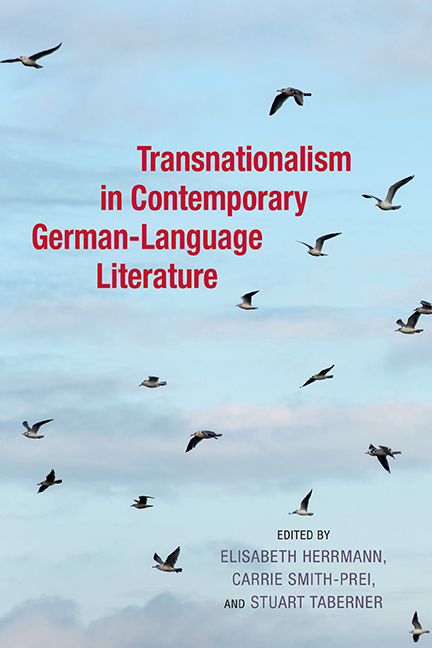6 - Writing Travel in the Global Age: Transnationalism, Cosmopolitanism, and the Reworking of Generic Conventions of Travel Literature in Ilija Trojanow's An den inneren Ufern Indiens and Nomade auf vier Kontinenten
Published online by Cambridge University Press: 10 June 2021
Summary
Transnationalisms in Question
ILIJA TROJANOW's LITERARY PRODUCTION provides an ideal case study with which to map the complicated relationships between transnationalism and cosmopolitanism. Trojanow's fiction and nonfiction works are profoundly concerned with historical and emerging transnational networks, from the history of colonialism and its attendant forms of migration and diaspora to more contemporary forms of global trade, commerce, and activism. This attention to diverse forms of transnationalism reminds us of the complexity and ambivalent nature of the concept: operating on multiple, and at times interconnected spatial scales, from the informal and private to the public and collective, transnationalisms can offer liberating spaces for dynamic exchange and cooperation but also further entrench old divisions—for example, of sex, race, or class—across, as well as within, national boundaries.
This point is underscored in Trojanow's best-selling historical fiction Der Weltensammler (2007; The Collector of Worlds, 2008), in which the figure of Sir Richard Frances Burton offers a powerful reminder that there is no direct correlation between transnationalism and cosmopolitanism. Burton's transnational existence fostered an admiration for other languages, customs, and religions, but this appreciation did not extend to all those peoples he encountered, nor did this admiration prevent him from utilizing his knowledge to advance British colonialism or the violence committed in its name. As Edward Said has noted, while Burton's extensive travels and his knowledge of various cultures may have made him an exception to many of his peers, he was not simply a rebel against Victorian authority, but in many ways its most effective agent. Employing the figure of Burton, Trojanow reminds us that lives lived transnationally may produce transcultural competence, but they do not necessarily foster the respect for and openness to otherness associated with various strands of cosmopolitan thought (for example, in the forms of moral, cultural, romantic, or kynical cosmopolitanism discussed by Stuart Taberner earlier in this volume).
Nor should we see historical forms of transnationalism as exceptional; throughout his work, Trojanow shows that the relationship between transnationalism and cosmopolitanism remains fraught. In the opening passages of his travelogue, Nomade auf vier Kontinenten (Nomad on Four Continents, 2008), for example, he argues that old myths and misconceptions have persisted well into the present:
Das 19. Jahrhundert ist in hohem Maße gegenwärtig. Viele unserer Vorstellungen von Differenz—bezogen auf fremde Länder und Kulturen—wurden damals geformt… .
- Type
- Chapter
- Information
- Transnationalism in Contemporary German-Language Literature , pp. 125 - 143Publisher: Boydell & BrewerPrint publication year: 2015
- 1
- Cited by



